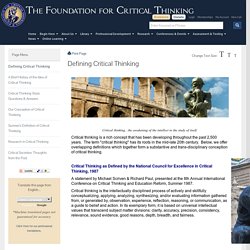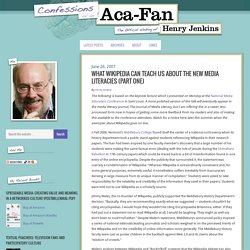

Defining Critical Thinking. It entails the examination of those structures or elements of thought implicit in all reasoning: purpose, problem, or question-at-issue; assumptions; concepts; empirical grounding; reasoning leading to conclusions; implications and consequences; objections from alternative viewpoints; and frame of reference.

Critical thinking — in being responsive to variable subject matter, issues, and purposes — is incorporated in a family of interwoven modes of thinking, among them: scientific thinking, mathematical thinking, historical thinking, anthropological thinking, economic thinking, moral thinking, and philosophical thinking. Critical thinking can be seen as having two components: 1) a set of information and belief generating and processing skills, and 2) the habit, based on intellectual commitment, of using those skills to guide behavior. Critical thinking varies according to the motivation underlying it. Another Brief Conceptualization of Critical Thinking.
WHAT WIKIPEDIA CAN TEACH US ABOUT THE NEW MEDIA LITERACIES (PART ONE) The following is based on the keynote lecture which I presented on Monday at the National Media Education Conference in Saint Louis.

A more polished version of this talk will eventually appear in the media literacy journal, The Journal of Media Literacy, but I am offering this in a rawer, less processed form now in hopes of getting some more feedback from my readers and also of making this available to the conference attendees. Watch for a notice here later this summer when the exemplar about Wikipedia goes on line. n Fall 2006, Vermont’s Middlebury College found itself the center of a national controversy when its history department took a public stand against students referencing Wikipedia in their research papers. Core Subjects and 21st Century Themes.